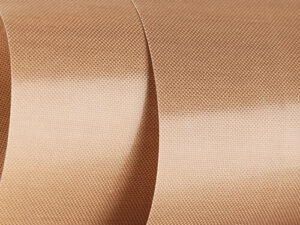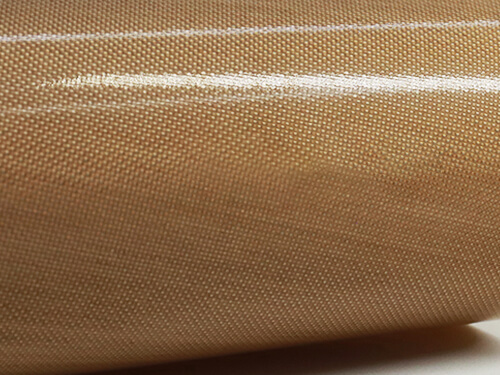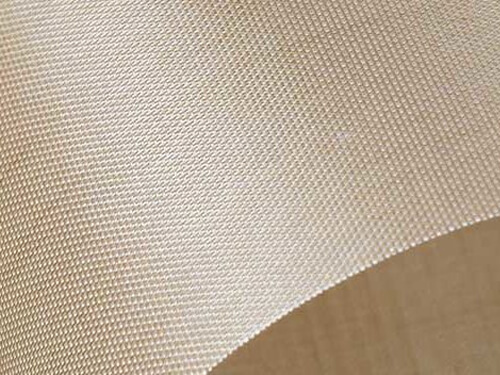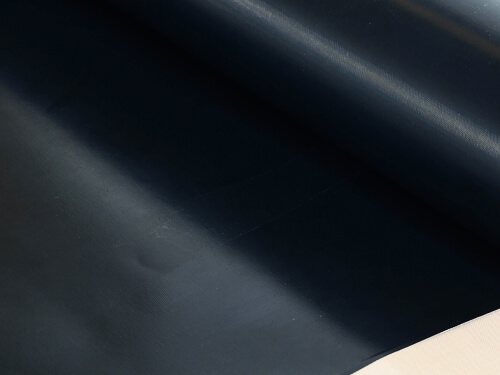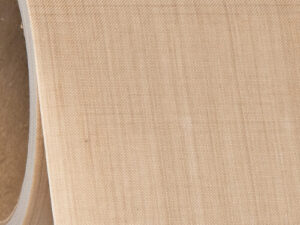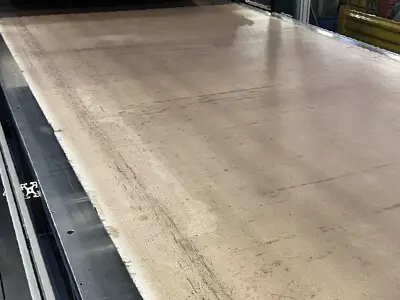PTFE Coated Fiberglass Closed Fabric Belts
HOME / PRODUCTS / PTFE Or Silicone Coated Belts / PTFE Coated Fiberglass Fabric Belts / PTFE Coated Fiberglass Closed Fabric Belts


Very Smooth | FDA-attested | Antistatic | Work Temperature: -150°C to +260°C | PTFE Coated Fiberglass Closed Fabric Belts
Specialized conveyor belts made with PTFE closed fabric are designed for various industrial applications. These belts feature a seamless fabric coated with Polytetrafluoroethylene (PTFE), a synthetic fluoropolymer renowned for its non-stick properties and exceptional resistance to temperature and chemicals. The closed fabric design ensures a smooth, continuous surface, making them ideal for specific conveying needs.
Key Features:
The main features of PTFE closed fabric belts contribute to their versatility and suitability for various industrial applications.
- Non-Stick Properties
PTFE closed fabric belts are renowned for their non-stick surface, preventing materials from adhering to the belt during conveying and processing. This feature is crucial in industries where cleanliness and product integrity are paramount. - Temperature Resistance
PTFE closed fabric belts can withstand a broad temperature range, making them suitable for applications involving both extreme heat and cold. They maintain their properties and performance in conditions ranging from high temperatures to sub-zero temperatures. - Chemical Resistance
The high resistance to chemicals of PTFE closed fabric belts makes them suitable for use in industries where exposure to corrosive substances is common. This feature ensures the longevity and durability of the belts in challenging chemical environments. - Durability and Longevity
PTFE closed fabric belts, particularly those with high PTFE content, are renowned for their durability. They have a longer lifespan, reducing the frequency of replacements and maintenance requirements. - Versatility in Surface Options
PTFE closed fabric belts offer versatility in surface options. They can have a very smooth surface or a fabric structure, catering to different application needs. This allows customization based on the specific requirements of the industry. - Color Options
PTFE closed fabric belts are available in different colors to meet specific industry standards and requirements. For example, brown belts may be FDA-attested for safe use in the food industry, while black belts may be antistatic and UV-resistant. - Customizable Dimensions
PTFE closed fabric belts come in various dimensions to accommodate different industrial applications. This includes customizable width (up to 5000 mm) and thickness (ranging from 0.04 mm to 2 mm), allowing for flexibility in design and usage. - Joint Options
PTFE closed fabric belts offer different joint options, including mechanical or permanent joints. The choice of joint type can be tailored to specific conveyor system requirements, providing flexibility in the design and assembly of conveyor systems. - Side Reinforcement
PTFE closed fabric belts may feature side reinforcement with materials such as PTFE fabric or PTFE film. This enhances the strength and stability of the belts during operation. - Guiding Systems
Various guiding systems, such as PTFE knobs, steel rivets/knobs, silicone, or aramid cord, can equip PTFE closed fabric belts. These systems help maintain proper alignment and stability during conveyor operation.
Materials Available
Key Applications:
PTFE Coated Fiberglass Closed Fabric Belts find a wide range of applications across various industries due to their unique properties.
- Food Processing Industry
PTFE closed fabric beltsare commonly used in food processing for applications such as baking, cooking, and conveying. Their non-stick properties and compliance with food safety standards make them ideal for this industry. - Textile Industry
The textile industry employs PTFE closed fabric belts for processes like dyeing and drying. The non-stick surface prevents materials from adhering to the belt during these operations. - Automotive Industry
In the automotive sector, PTFE closed fabric belts are utilized for conveying and processing applications. The belts’ durability, resistance to chemicals, and temperature stability make them suitable for various manufacturing processes. - Chemical Processing
Industries involved in chemical processing and manufacturing often use PTFE closed fabric belts due to their high resistance to chemicals. They can withstand exposure to corrosive substances without degradation. - Woodworking Industry
PTFE closed fabric belts are employed in woodworking applications for conveying and processing. Their resistance to high temperatures is beneficial in woodworking processes. - Photovoltaic Industry
PTFE closed fabric belts find applications in the photovoltaic industry for specific manufacturing processes. The belts’ temperature resistance and non-stick properties contribute to their effectiveness in this sector. - Packaging Industry
Companies use PTFE closed fabric belts in packaging for conveying and processing applications. The non-stick surface facilitates smooth movement of materials, and the belts can withstand the demands of packaging machinery. - Screen Printing
PTFE closed fabric belts are utilized in screen printing applications. The non-stick surface and temperature resistance make them suitable for this precision-oriented process. - Production of Carpets and Flooring
PTFE closed fabric belts are employed in the production of carpets and flooring materials. Their versatility and customization options contribute to their effectiveness in this manufacturing process. - High-Temperature Applications
Companies choose PTFE closed fabric belts for applications that involve exposure to high temperatures because they can withstand a broad temperature range without losing their properties.

